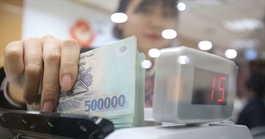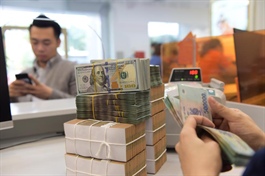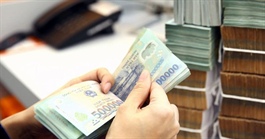Higher funding costs to have limited impact on Vietnamese banks
Higher funding costs to have limited impact on Vietnamese banks
The Vietnamese central bank’s move to lift short-term deposit rate caps is likely to raise the average cost of funds – both deposit and interbank rates – for Vietnamese commercial banks.

However, the banks should be able to pass some of the additional cost on to borrowers, limiting the impact on net interest margins (NIM), according to Fitch Ratings.
In a recent report, the rating agency said the State Bank of Vietnam’s (SBV) decision to raise key policy rates by 100 basis points on September 22 exceeded its expectation that these rates would rise by only 50 basis points by end-2022.
It follows a sharp rise in US interest rates and weakening global demand prospects, which have increased the risk of capital outflows and contributed to downward pressure on the Vietnamese dong, although the currency has weakened by less against the US dollar than many other APAC currencies this year.
“We now believe that further policy rate hikes are likely in the near term, partly in order to reduce the risk that exchange-rate weakening could add to imported inflation, and further upward pressure on deposit rates is likely as US dollar interbank rates push up against dong interbank rates,” Fitch said.
According to Fitch, the policy rate adjustments will have little impact on Vietnamese banks, as they apply to central bank facilities that do not constitute an important source of funding for most major banks. The increase in deposit rate caps, which took those for one-six month dong deposits to 5 per cent, will have more impact as the caps have constrained deposit rates at a number of banks in recent months.
“This will raise funding costs to a modest extent, but we believe major Vietnamese banks are well placed to absorb these higher costs. Demand for loans is robust and credit expanded by 17.2 per cent year-on-year by September 16, but lending is constrained by the SBV’s cap on annual system credit growth, which the central bank recently reaffirmed at 14 per cent for 2022.
Fitch believes demand for credit is likely to outstrip the quota-constrained supply in the remainder of the year and credit conditions are unlikely to ease much, as persistent inflationary pressures amid robust domestic growth and further dong depreciation will leave the SBV wary of faster credit expansion.
“We still expect banks to be able to raise yields, even if lending rates for some priority sectors are held down through informal guidance from regulators and social pressure. Banks have, for example, been shifting lending portfolios towards higher-yielding segments like retail, and may also be able to bundle other fee-generating products with much-coveted loans.
“We still view the overall outlook for net interest margin (NIMs) and earnings as positive, even though the increase in funding costs relative to our previous assumptions will dampen upsides for NIMs. This is because of rate pass-through, higher balance sheet leverage, and because the quota constraint on credit growth and a lack of alternative financing sources leave banks in a favourable bargaining position with borrowers. Consequently, the limited rise in funding costs that we now anticipate is unlikely to affect banks’ standalone credit profiles, as there is adequate headroom at current rating levels. Moreover, the Issuer Default Ratings of most Fitch-rated Vietnamese banks are driven by our expectations of extraordinary support, which are more sensitive to movements in the sovereign rating."
According to Fitch, Vietnamese banks could nonetheless be vulnerable if interest rates rise sharply beyond Fitch’s base case. Corporate leverage is high and interest-rate hedging rare, so a spike in lending rates would weigh on asset quality. Banks’ capital buffers are generally thin, especially at State-owned banks, reflecting persistently rapid loan growth. This reduces their ability to absorb any unexpected spike in credit costs.












